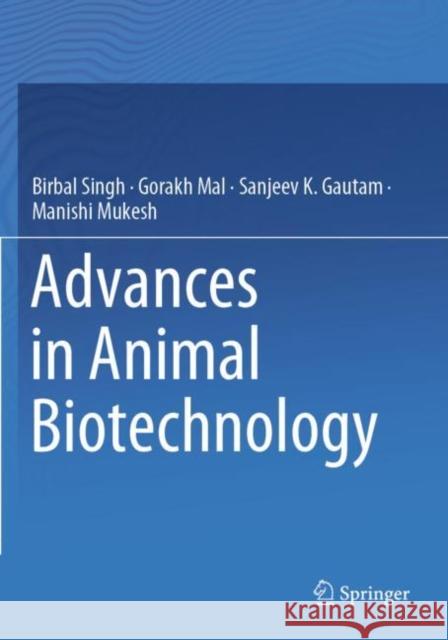Advances in Animal Biotechnology » książka



Advances in Animal Biotechnology
ISBN-13: 9783030213114 / Angielski / Miękka / 2020 / 562 str.
Advances in Animal Biotechnology
ISBN-13: 9783030213114 / Angielski / Miękka / 2020 / 562 str.
(netto: 421,70 VAT: 5%)
Najniższa cena z 30 dni: 424,07
ok. 16-18 dni roboczych.
Darmowa dostawa!
Part 1: Gut microbiome and nutritional biotechnology
B. Singh
B. Singh, Ph. D., is Principal Scientist (Professor) at ICAR-Indian Veterinary Research Institute, Regional Station Palampur, India. He earned his doctorate (Animal Biotechnology) in 2007 from ICAR-National Dairy Research Institute, Karnal, India. He worked on nuclear transfer cloning in water buffaloes.
Dr. B. Singh is one of the leading experts in the field of animal biotechnology. He has contributed to research and teaching at post graduate levels. His expertise includes biotechnology of gut microbiome, somatic cell nuclear transfer cloning, and stem cell biology. In addition, he has worked on molecular biology, biochemical genetics, and cryopreservation of fish germplasm during his profession at ICAR-National Bureau of Fish Genetic Resources, Lucknow, India.
As a researcher, he has published more than 75 research and review papers in peer reviewed journals, more than 100 research abstracts, technical bulletins, and authored two books, namely “Textbook of Animal Biotechnology”, and “Reproduction Biotechnology in Buffalo”, and 20 chapters in books published by Elsevier, Springer and NOVA. He is reviewer for various international journals, and life member of assorted prestigious scientific societies.
G. Mal
Prof. G. Mal, Ph. D. is Principal Scientist (Biochemistry), and Station Incharge at ICAR-Indian Veterinary Research Institute, Regional Station Palampur, India. He obtained his master’s degree in Biochemistry from Himachal Pradesh Agriculture University Palampur, (India), and Ph. D. (Molecular Biology and Biotechnology) from University of Sheffield, South Yorkshire, U.K.
Dr. G. Mal has experience in molecular biology of cancer, gut microbiome and reproduction biology. He has published more than 80 scientific research papers and reviews, and more than 75 scientific abstracts in national and international journals. He has authored 2 books and contributed 15 book chapters. Dr. Mal has developed need-based technologies for value-added camel milk products during his services at ICAR-National Research Centre on Camel, Bikaner (India). He is reviewer for many prestigious international journals, and life member of various professional scientific societies.
Sanjeev K. Gautam
Sanjeev Gautam earned his Ph. D. (Animal Biotechnology) in 2007 from ICAR-National Dairy Research Institute, Karnal. He has worked as research consultant at Institute for Cellular Medicine, San Jose, Costa Rica and Cryosave Labs, Mechelen, Belgium. In late 2007, he joined as Assistant Professor in Department of Biotechnology, Kurukshetra University, Kurukshetra, India. In 2008, he visited, University of New Mexico, Albuquerque USA for postdoctoral research. In 2010, he went for Postdoc in Lund University, Sweden where he worked on neuro stem cell biology. His areas of research include Stem Cell Biology and Animal Biotechnology.
He has vast teaching and research experience at graduate as well as postgraduate levels.
He is basically a stem cell biologist with expertise in human and animal stem cells. He has published more than 60 scientific papers of national and international repute. He is reviewer/editor/editorial board member of many International journals. He has guided three Ph. D. students and many M. Sc. students in the field of Biotechnology. He is co-author of “Textbook of Animal Biotechnology” (TERI, New Delhi). Currently, Dr. Gautam is working as visiting faculty in the Department of Biochemistry and Molecular Medicine, School of Medicine, University of California, Davis USA.
M. Mukesh
Manishi Mukesh, Ph. D. is working as the Principal Scientist (Professor) and ICAR National Fellow at Department of Animal Biotechnology, ICAR-National Bureau of Animal Genetic Resources, Karnal (India). He obtained his Master’s degree in Animal Biotechnology from National Dairy Research Institute, Karnal and doctorate in Biotechnology from Panjab University, Chandigarh (India). He has more than 20 years of experience as a research scientist in the area of cattle and buffalo genomics. He is engaged in assessing the genome diversity of various cattle breeds of India using neutral and functional markers. His group has made significant contribution to the area of mammary gland transcriptomics and functional genomics of riverine buffaloes.
Currently, he is engaged in thermoregulation genomics to understand the molecular basis of thermotolerance and adaptation of Indian cattle and buffalo breeds to diverse agroclimatic conditions. He has worked at Mammalian NutriPhysioGenomics Lab, University of Illinois, USA to understand various tissue transcriptomic responses during various physiological conditions in high producing dairy cattle.
Dr. M. Mukesh has published more than 80 research papers in peer-reviewed international journals. He has contributed in several book chapters, technical bulletins and monographs on cattle breeds based on the phenotypic and molecular characterization. Dr. Mukesh has been awarded CAR- National Fellow position by the Indian Council of Agricultural Research (ICAR) for his contribution in the area of animal sciences.
This book presents significant innovations in animal biotechnology and their relevance to humans. It offers an update on cutting-edge technologies and advances in key aspects of genetic engineering, metagenomics, assisted reproduction, biotechnology in veterinary health, as well as the role of gut and marine microbial ecosystems in industrial development. It also includes chapters on camelids, fishery, designer milk and nutraceuticals from bioengineered organisms and reviews scientific advances such as genomics and transcriptomics with reference to their applications in the animal industry.
The chapters from expert authors are organised in five themed parts; Part I "Gut microbiome and nutritional biotechnology", Part II "Assisted reproduction biotechnology", Part III "Livestock genomics", Part IV "Health biotechnology" and Part V "Animal biotechnology in global perspective".
Its broad spectrum makes this work a valuable resource for professionals, researchers, academics and students in the field of veterinary and animal production as well as the biotechnological industry.
1997-2026 DolnySlask.com Agencja Internetowa
KrainaKsiazek.PL - Księgarnia Internetowa









